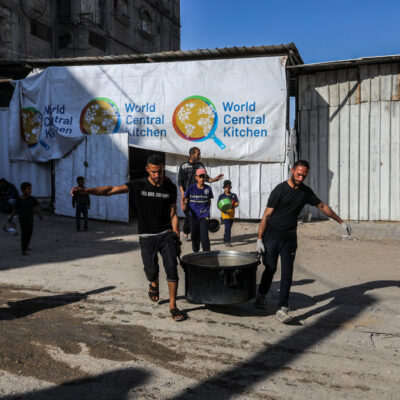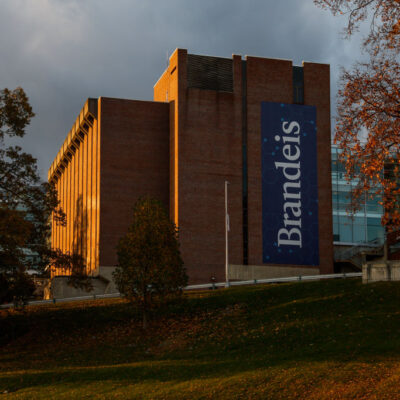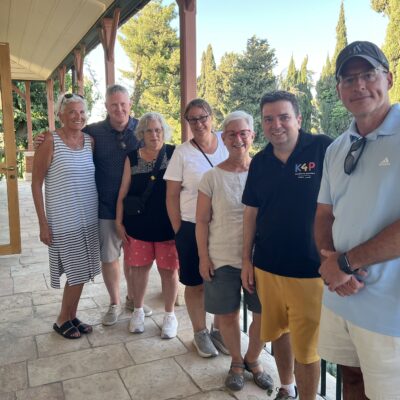FOOD SECURITY
As war devastates Israeli agriculture, Leket pivots from ‘rescuing’ produce to buying it, boosting farmers
While still providing food to Israel’s poor, the organization has shifted its focus to ensuring the survival of the country’s domestic agricultural production, providing volunteers, grants and loans

Courtesy/Leket
Volunteers work at the Leket logistics center outside of the central Israeli town of Kfar Saba.
The Israeli food security nonprofit Leket has dramatically shifted its focus in the wake of the Oct. 7 terror attacks and ongoing fighting in southern and northern Israel, halting the vast majority of its normal food rescue efforts and concentrating much of its work on bolstering Israel’s farmers and agricultural sector.
Leket, which marked its 20th anniversary last year, had planned to rescue 29,000 tons of produce from Israeli fields — fruits and vegetables that for some reason weren’t worth it for farmers to sell and would otherwise be burned or left to rot — and millions of prepared meals from army bases, hotels and cafeteria in 2023, but in the final quarter of the year, that all went off the rails.
“Ordinarily our focus is on using excess crops to feed the poor. That hasn’t changed. That’s still what we would like to be doing. We’re still doing it, but it’s just dropped by 80%,” Joseph Gitler, the founder and chairman of Leket Israel, told eJewishPhilanthropy.
The Israeli agricultural sector has been devastated by the war in multiple ways. For some of the farms along Israel’s borders with Gaza and Lebanon that were hit by rocket and missile fire, simply accessing them has been next to impossible. But also for farms throughout the country, the war has driven away nearly all of the foreign nationals who work as farm hands, and many of the Israelis who work in agriculture have also been called up to the reserves.
While Leket is still dedicated to food security, ensuring that Israelis experiencing poverty are able to obtain sufficient, healthy foods, the organization is now also focused on a larger, national understanding of food security — ensuring that the country can produce the food that all of its citizens need.
Gitler noted that the attacks on cargo ships in the Red Sea by Yemen’s Houthis and the growing antagonism from some of the countries that provide much of Israel’s imported produce have driven home the need for Israel to maintain its domestic food production capabilities, even though locally grown fruits and vegetables are almost always more expensive than their imported counterparts.
“I think it strengthens this idea that we really need to keep our farmers in business,” Gitler said. “We always need to find the middle ground between keeping food and vegetable prices reasonable, but also protecting our farmers.”
Instead of rescuing the vast majority of the food that it gives to some 275 nonprofits who, in turn, distribute it to thousands of Israelis in need, Leket has been purchasing it from farmers, often at market rates.
“Since Oct. 7, we’ve re-engineered,” Gitler said. “Everything is focused on: How do we help the farmers? So that’s sending them volunteers. And normally, when we send volunteers to help a farmer, we take the crops. That’s the whole idea of Leket. But now, everywhere we send volunteers to, we don’t take the crops. And if the farmer can’t sell them, we’re willing to buy [the crops]. And we’re doing that for two reasons. One, we want to help farmers. We need them to stay in business for the short- and long-term food security of this country. And [two], we need those crops to take care of the poor.”
Leket is also working with two non-bank lenders — Ogen and Koret Israel Economic Development Funds — to develop new low-interest loan programs specifically for farmers. (At least a portion of this loan program will be supported by the Jewish Federations of North America recently announced loan fund.) In addition, Leket has partnered with the Strauss food company to create a $10 million grant fund for farmers.
“There will also be, at some point, government loans and government grants, but that’s going to be a long time coming,” Gitler said.
Gitler said Leket was still working on the exact details of the loan program with Ogen and Koret, but intended to offer loans of up to NIS 300,000 ($79,500) to farmers at low interest rates.
“Interestingly, we first thought, no-interest [loans],” Gitler said. “But both [Ogen and Koret] feel that super low interest is better than no interest. It actually gets people more motivated to pay back. We want them to pay back. We hope they’re going to pay back.”
Even before the war, Leket was the second-largest volunteer operation in the country, after the volunteer-run Magen David Adom ambulance corps. In the aftermath of the Oct. 7 attacks, Leket has remained one of the more significant volunteer coordination organizations, helping direct tens of thousands of volunteers to farms around the country, where they weed, harvest, sort and pack fruits and vegetables of all types. Dozens of volunteers also come each day to Leket’s logistics center outside of the central Israeli town of Kfar Saba, working in three shifts to package the rescued and purchased produce into boxes. Many of the volunteers, both on farms and in the logistics center, are retirees who have ample free time and are looking for ways to help.
“They feel that as civilians, they can’t help in the war itself, so this is a way for them to contribute,” Maayan Hadad, one of Leket’s volunteer coordinators, told eJP during a recent visit to the logistics center.
One such regular logistics center volunteer, Madelein, who moved to Israel in 1969 — “Just in time for the Yom Kippur War,” she chuckled — said the work was tedious and, at times, tough. “But if I can do it, then it’s the least I can do,” she said. “In the previous wars, I was younger and could do more.”
In addition to volunteering with Leket, Madelein, who declined to give her last name, said she also baked cakes and cookies for soldiers. “You do anything you can,” she said.
According to Gitler, it is not yet clear how much of Leket’s current operations will remain once the war is over, both in practical terms of purchasing — instead of rescuing — crops and more broadly with its focus of boosting farmers and domestic agriculture.
“I can’t tell you what’s going to be in the future. I think I can tell you that our work with farmers has changed permanently,” Gitler said.
“Our farmers are going to get used to the fact that we’ve been purchasing [their crops]. And the fact is, that’s life. We tell the farmers that what we’re doing is temporary, but it’s been three months and we just approved our 2024 budget. And as part of the budget, we approved the continued purchase of 8 million pounds of crops over the next three months,” he said.
Gitler said he believed that over time, the amount of crops that Leket purchases would go down, but likely not down to zero, and the amount it rescues would go back up, but other aspects of the organization’s current work would continue.
“Helping farmers with volunteers where needed, that may continue,” he said. “Even when it’s just for the good of the farmer. Because there are so many people who want to volunteer, so why not? That could be something that takes a more permanent place.”

 Add EJP on Google
Add EJP on Google









